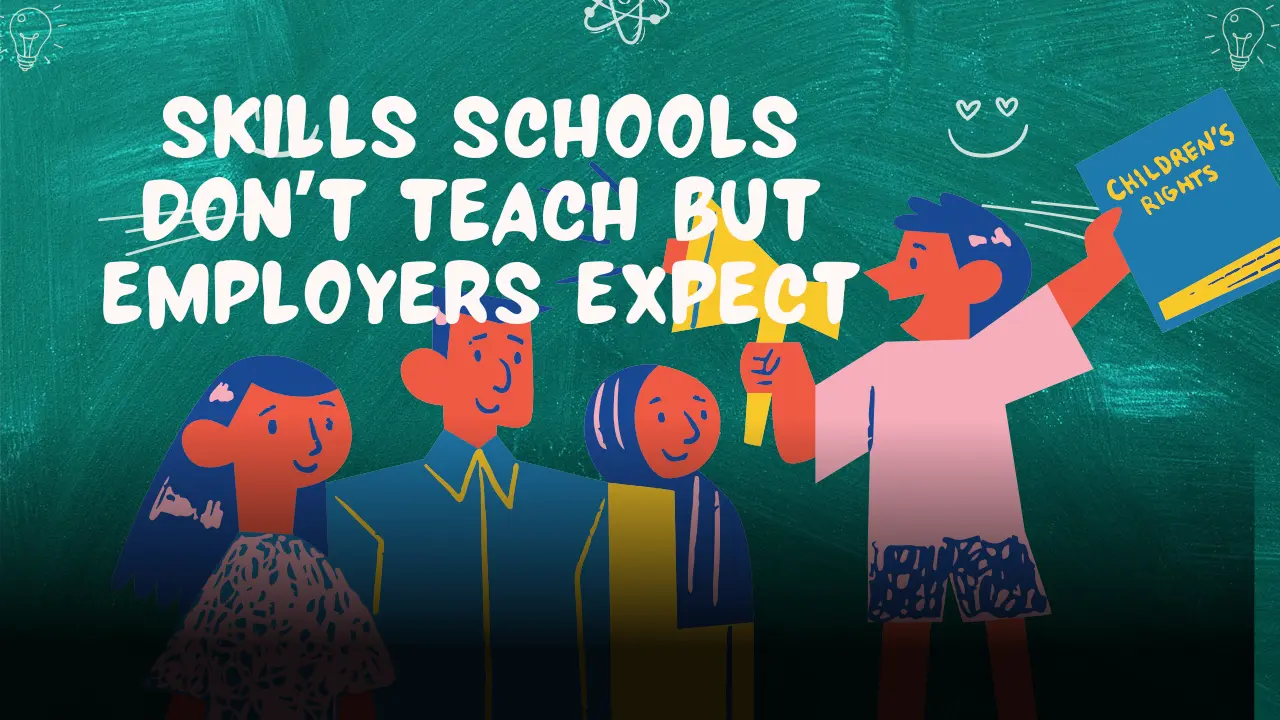When you graduate, you expect your degree to be the golden ticket into a rewarding career. But many young professionals are shocked when they realize academic knowledge alone isn’t enough.
In fact, a survey by the National Association of Colleges and Employers (NACE) found that over 77% of employers rank soft skills like teamwork, problem-solving, and communication higher than technical expertise.
This is the hidden curriculum — the skills no syllabus mentions, but every employer silently demands. Let’s uncover what they are, why they matter, and how you can start mastering them today.
1. Communication Skills: Your Career Currency
Scenario: Imagine you’re in your first job and your manager asks for a quick project update. You panic, mumble a few words, and send a long, confusing email later. The result? Missed trust points.
Employers expect you to:
- Speak clearly in meetings.
- Write crisp, professional emails.
- Tailor your tone for clients, teammates, and leadership.
🔑 Action Plan:
- Use the 3-3-3 email rule (3 sentences max, 3 bullet points if needed, 3-minute read).
- Record yourself explaining your daily tasks in under 1 minute. This helps you practice clarity.
- Join a public speaking group or practice short LinkedIn posts to sharpen tone and confidence.
2. Time Management: Beating the Chaos
Scenario: In college, deadlines are fixed. At work, you’ll juggle overlapping projects, meetings, and last-minute “urgent” tasks. Without time management, you’ll quickly burn out.
🔑 Action Plan:
- Try the Pomodoro Technique (25 min deep focus + 5 min break).
- Prioritize tasks with the Eisenhower Matrix (Urgent vs. Important).
- End every workday by writing your Top 3 priorities for tomorrow.
3. Networking: Your Unseen Resume
Fact: According to LinkedIn, 85% of jobs are filled through networking. Yet schools never teach students how to build professional relationships.
Networking doesn’t mean handing out business cards at random. It’s about building genuine connections.
🔑 Action Plan:
- Reach out to alumni working in your field. Ask for 15-minute coffee chats, not jobs.
- After meeting someone new, send a thank-you note or a LinkedIn message referencing your conversation.
- Be a “giver”: Share helpful resources or congratulate peers on achievements.
4. Adaptability: Thriving in Change
Technology evolves every 6 months. Entire industries transform in a few years. Employers need people who learn fast, unlearn faster, and stay curious.
🔑 Action Plan:
- Learn one new tool every quarter (e.g., project management, AI tools, or data visualization).
- Treat mistakes as feedback loops, not failures.
- Say yes to projects slightly outside your comfort zone — that’s where growth happens.
5. Emotional Intelligence (EQ): The Secret Leadership Skill
Fact: A Harvard study found that EQ accounts for 90% of what sets high performers apart from peers with similar technical skills.
EQ helps you manage stress, navigate office politics, and collaborate smoothly.
🔑 Action Plan:
- Practice “Pause & Respond” instead of reacting instantly to conflict.
- Use active listening: repeat back what someone said before replying.
- Keep a reflection journal to track emotional triggers and how you handled them.
6. Financial Literacy: Building Stability Beyond Paychecks
Employers don’t expect you to be an investment guru, but they do expect financial maturity. Poor money habits can lead to stress that spills into work performance.
🔑 Action Plan:
- Follow the 50/30/20 rule (50% needs, 30% wants, 20% savings/investments).
- Learn basics of taxes, insurance, and retirement plans early.
- Use beginner-friendly finance books like Rich Dad Poor Dad or apps like Mint.
FAQs: The Hidden Curriculum Answered
Q1. Why don’t schools teach these skills?
Because academic curricula focus on measurable outcomes like exams, not lifelong soft skills. But many universities are now introducing “career readiness” modules.
Q2. Can I learn these skills online for free?
Absolutely. Platforms like Coursera, LinkedIn Learning, and YouTube have excellent resources. The key is practice — not just watching tutorials.
Q3. Which hidden skill should I start with first?
Start with communication. It’s the foundation of networking, leadership, and problem-solving.
Final Takeaway
Your degree is proof of knowledge, but the hidden curriculum is proof of readiness. Employers hire not just for what you know, but how you apply it in the messy, unpredictable real world.
If you want to accelerate your career, start treating these skills like a subject worth studying. Unlike exams, they don’t end after graduation — they grow with you.
